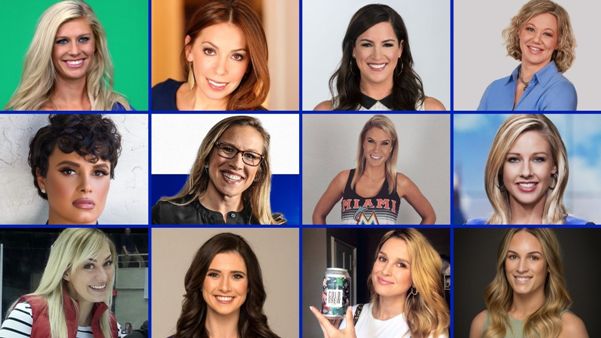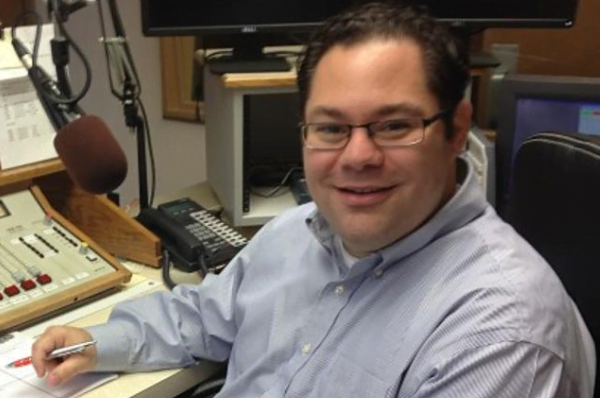I contributed a few thoughts and pieces of information to a story The Athletic published earlier this week titled Why Do So Few Women Work in Sports Radio? If you haven’t read it yet I encourage you to do so. The research done by Lisa Dillman and Sean Fitz Gerald was fantastic.
As I read the piece, I saw example after example of why this issue should be a thing of the past, and as the social responses began flooding in I thought ‘good for them, make your voices heard‘. Most involved in the conversation shared why women deserved better treatment in a format that’s largely ignored them, and just seeing the issue receive attention was a positive reminder that our business has a lot of room for improvement.
But then it hit me. It’s a great read, a valid question, and an issue which should produce far greater results in 2020 than it did in 2000 or 2010, but having traveled down this road many times before I’m not sure much is going to change anytime soon.
I saw the same public reaction to similar stories I wrote in recent years. I heard the same frustrations from women in the industry who I’ve talked to throughout the years. I’ve led on stage discussions on this topic with women and industry leaders, and the results are always the same – the problem is acknowledged but no plan, strategy or commitment is made to change it.
This may rub a few of you the wrong way. If it does, I don’t apologize. The truth hurts sometimes. In a format with nearly seven hundred stations, it’s inexcusable to have such little involvement from females. Spare me the excuses, show me the results.
Any woman who loves the sports radio industry enough to want to pursue a career in it should be welcomed with open arms if they have the talent to do the job. All these ladies have sought is a chance to prove they too love sports and can contribute to daily conversations while connecting with audiences. Yet there are programmers who fear the idea of a woman’s voice chasing away listeners. Others who don’t have the balls to take a risk and try something different. And some who just lack the ability to scout talent, resorting instead to hiring retread after retread because it’s easier.
Lineups across the country look similar to the way they did a decade ago. Sure there’s been a little progress when you see women like Sarah Spain, Amber Wilson, Joy Taylor, Jen Lada, Kayce Smith, Maggie Gray, Kate Scott, Michelle Smallmon, Sandra Golden, and Amy Lawrence occupying on-air roles on top stations and shows, but if sports radio leaders think hiring 15-20 women in a format that features hundreds of male voices represents a firm commitment to address the issue they’re sadly mistaken.
Answer me this, why is it that we don’t have one single sports station in this country featuring an all woman lineup on it? How many brands exist with a full roster of male talent? Hundreds would be the correct answer. Are you going to tell me that stations offering sports talk content that produce less than a 1 or 2 share couldn’t be used to try something different to actually create buzz and a potential new approach? What’s the worst that could happen, it fails? Isn’t that what a 1 share radio station is in the first place? By the way, you could raise the same question about no stations existing that feature a full roster of minority voices but I’m trying to keep this column focused on women.
And how about on the programming end. Why is it that I can count all of the women who oversee sports radio brands with less than ten fingers? Women can coach and referee men’s sports, excel on television and in podcasting, guide some of the largest media companies in the world, and run for the highest office in the land, but they can’t hold a prime position on a sports radio station?
I’m not naive, I recognize that the majority of the audience is male, and guys are more interested in sports radio than women. Ladies may not want to hear that but it’s true. Having run stations for a decade and spent the past five consulting brands and managing this website, the interest level is significantly higher among men seeking opportunities in the industry than it is of women. But it’s better now than it was ten years ago, and it could be even better in the future if we actually invited them to the party instead of telling them it’s an invitation only event.
The other side of the conversation that those advocating for change don’t like to hear about is that radio is first and foremost a business. If a sports station has 6-7 male personalities on the air producing strong ratings which help the station earn high revenues, why would they change it? Just because someone thinks they should have more on-air balance? If the numbers are strong and the dollars are coming in, radio groups aren’t going to mess with a winning formula. We can talk all day about being agents of change but if you’re running a business and it’s doing well, you’re going to be less focused on other issues because the current strategy is working.
That’s even more important in 2020 where this pandemic has created a lot of economic pain for radio operators. We can talk about diversity, the financial benefits of changing personnel, expanding the audience, and a whole list of other reasons of why it makes sense to consider adjustments, but we’ll be blue in the face before things take a different turn because profitable businesses don’t change until they’re forced to.
But that’s not the situation for the majority of brands in the format. For every 98.5 The Sports Hub, 97.1 The Ticket and KFAN that dominates its market and reserves the right to say ‘sorry guys, we’re thriving here and not screwing with it‘ there are plenty in need of a jolt to put ears and dollars on their airwaves.
One brand that does a great job elevating women is 1010XL, the sports radio leader in Jacksonville. The station has the rights to the Jaguars, features strong personalities who’ve been with the station for over a decade, and delivers results without subscribing to Nielsen. They could embrace the ‘it’s working so leave it alone‘ approach, yet they’ve consistently made it a priority to feature women on their airwaves. Lauren Brooks, Lauren Rew, Jessica Blaylock, Amanda Borges, Jordan DeArmon, Donna Murphy and Taylor Doll have all been part of on-air shows on the station and guess what – the predominantly male audience continues to listen to the radio station. Incredible right?
Let me give you another example. This one may surprise you even more. By most accounts, sports betting is seen as a male dominated space. Have you seen how many women are already contributing to sports betting brands? Go ahead and look them up – Ali Burns, Minty Bets, Lisa Kerney, Anita Marks, Lauren Joffe, Alyssa Rose, Ariel Epstein, Kelly in Vegas, Danielle Alvari, Jessie Coffield, Erin Kate Dolan, Rachel Bonnetta, Sara Perlman, and Chelsa Messinger. Sports betting content has grown in popularity over the past 5-6 years, and already groups like VSiN, DraftKings, FanDuel, FOX Sports, ESPN, SportsGrid and others are involving women faster than sports radio has.
Just thinking about this issue, and the prior work I’ve done examining it frustrates me. The solution to this problem isn’t going into every sports radio station and blowing out every male who occupies a spot. Many are doing their part to produce ratings and revenue. But there are certainly a lot of people who’ve been given numerous chances despite poor results, simply because they’re familiar to those in hiring positions. It’s fair to say that if a woman performed poorly for the same period of time as a male host, the likelihood of her getting a second opportunity to get back behind the mic and prove she could be successful is much lower.
If we’re going to make this situation better, Market Managers have to be more involved during the hiring process. How many have ever asked one of their PD’s ‘which women are you talking to for this position?’ I never had a GM ask me that question as a PD. They simply trusted me to do what I felt was best. I’m also embarassed by how little we see of women and minorities in PD roles. How does that change if GM’s and executives don’t prioritze it? Maybe you think the current results are acceptable. I don’t see it that way.
Continuing on the PD front, you guys in charge of brands also have to ask yourself if this situation really matters to you or not. I’m not sure everyone cares enough about it even if they publicly claim to be bothered by it. I am hardly ever asked by today’s programmers ‘are there any strong female hosts out there I should be looking at? and I rarely hear anyone mention female talent when on-air openings arise at their station. I did see Mitch Rosen in Chicago bring in Leila Rahimi for auditions with Dan Bernstein and Danny Parkins, Jen Lada was added in Milwaukee to ESPN 94.5 by Brad Lane, and Matt Nahigian hired Kate Scott to the morning show on 95.7 The Game. Those examples should be normal, not an anomaly.
Women also have a responsibility in this process too. Being relentless in the pursuit of opportunity is on you. Most PD’s aren’t going to come find you, and not every agent is going to call with news on your next gig. For every female who applied to one of my sports radio stations, I’d see 500-1000 emails, resumes, and applications from men. Since going on my own and launching BSM, the level of interest from females writing here compared to men is also very low. I was lucky to find Chrissy Paradis and previously had a female social media director, but the desire to work in the industry is higher among men, so women who want to be part of it need to be ready to knock on doors, dial phone numbers, and litter inboxes until they’re given the opportunity to chat. It’s fair to say you’re under represented. I agree with you. But that doesn’t excuse a lack of persistence.
As far as companies are concerned, executives need to put a higher priority on talent, and decide if they want to be great or just live quarter to quarter worrying about the bottom line. In the talk business, you’re nothing without unique talent striking a chord across multiple platforms. You can ask your morning host who runs a 4-hour radio show to write a daily blog, cut a weekly video, produce an original podcast and meet with current and potential advertising clients, but that’s not a path to long-term digital success. All you’re doing is stretching someone thin and attempting to play in a space you deem important without committing any real resources to it.
Our brands can create and distribute radio programs, original podcasts, social video, and online written content, but to do it effectively you need people. I’m sure there are many women who’d love to contribute to your digital content, but if stations won’t spend money to develop digital talent, and tomorrow’s radio stars, what are women supposed to think? You’re telling them the path to opportunity in sports radio doesn’t exist.
If there’s one thing I was good at as a programmer it was finding talent. I didn’t hit homeruns every time, but I never stopped scouting and looking in different places. I also wasn’t afraid to roll the dice and live with the results. What’s the worst thing that could happen? I lose a job? If you program in fear, I question if you should be managing the brand. Too many people look at what could go wrong rather than what could go right. I’d rather go down trying to create something special than stay afloat being lost in the noise.
Case in point, I hired Joe Fortenbaugh to be a host on the morning show in San Francisco depite never previously hosting a radio show full time. I did the same hiring John Middlekauff, Aubrey Huff, and Rick Venturi as hosts. I went to smaller markets to hire Guy Haberman and Zach McCrite, watched videos of Anna Kagarakis on YouTube to hire her as an update anchor, named Tony Softli a Rams Reporter/Host the week after he exited an NFL front office, and after studying San Francisco’s demographics and the lack of minority voices that existed on-air, I launched a promotion ‘Lucky Break’ in San Francisco to give an unknown person a chance to become a host. The final 4 contestants were a mix of Black and Hispanic voices, and the two Hispanic guys (Rudy Ortiz and Brandon Santiago) went on to host shows in the market, and the winner, Daryle ‘The Guru’ Johnson, is now in middays on 95.7 The Game and is one of the best people and talent in the market.
I’m not bringing up those examples in search of credit. I raise them to explain that one person with vision and confidence CAN make a difference. Nobody told me I had to improve the station’s diversity, hire unproven talent or dig thru YouTube looking for interesting people. I did it because my job was to look anywhere and everywhere to find people to build a great radio station. I see people out there today that fit this bill too but more times than not, the names and faces hired in sports radio look and sound the same.
This notion that female personalities can’t be successful in sports radio is nonsense. Many who see the business that way are out touch and unlikely to evolve. Rather than listening to someone who’s living in the past and lacks the spine to do something different, maybe take a chance to try and do something epic. Who knows, it might just strengthen your job security. But that’d require thinking about what could go right, and welcoming women to a party they’ve been given limited access to.

Jason Barrett is the President and Founder of Barrett Media since the company was created in September 2015. Prior to its arrival, JB served as a sports radio programmer, launching brands such as 95.7 The Game in San Francisco, and 101 ESPN in St. Louis. He also spent time programming SportsTalk 950 in Philadelphia, 590 The Fan KFNS in St. Louis, and ESPN 1340/1390 in Poughkeepsie, NY. Jason also worked on-air and behind the scenes in local radio at 101.5 WPDH, WTBQ 1110AM, and WPYX 106.5. He also spent two years on the national stage, producing radio shows for ESPN Radio in Bristol, CT. Among them included the Dan Patrick Show, and GameNight.
You can find JB on Twitter @SportsRadioPD. He’s also reachable by email at Jason@BarrettMedia.com.










I agree that being an “expert” doesn’t depend on what sex you are but a lot of these you mention have a woman in a particular role simply because they are a woman, not because they are an expert. In fact several of these listed are contradictions within themselves, they refer to them as “expert handicappers” yet they don’t list them among the Expert Handicappers on their own websites. Sex, Race, etc have no place in deciding who is and who isn’t an expert but sites shouldn’t be applauded for throwing the “hot chick” out there to exploit them as click bait, and while some of these listed are in fact experts, your recognition of the others is part of the problem.
Any female given an opportunity to work in the sports media industry in a host, co-host or analyst role is a big deal. I’m not suggesting that any of the women mentioned in the sports betting category are seen as the face of a brand but when they’re given a chance to guide conversations, and share opinions, that’s more than what usually exists in sports radio.